It turns out that Cochrane’s for Christmas, not just for life, with evidence in the Cochrane Library on all manner of festive things from gold, frankincense and myrrh to stockings! Ok, some of the links are a bit tenuous, but we hope you’ll enjoy our advent calendar.
Owing to some trouble with the technology elves, we couldn’t make it interactive (boo!) but each day we’ll post some Cochrane evidence related to the day’s picture, below the calendar. If you think of any others, do share them via the comments box.
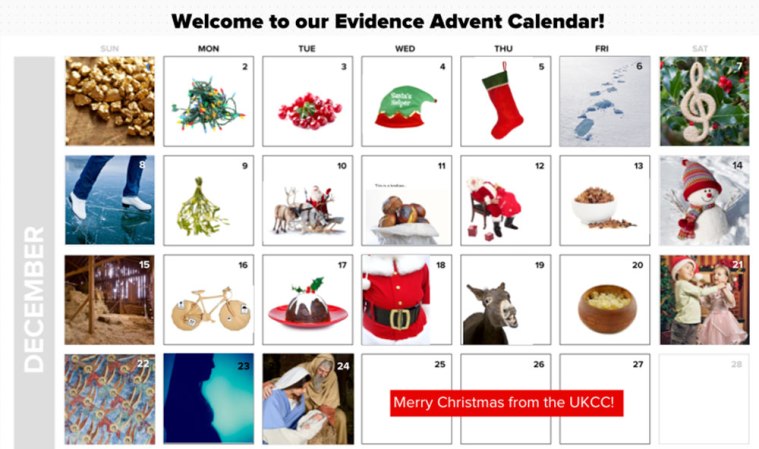
 24th – Mary, Joseph and Jesus (continuous support in labour)
24th – Mary, Joseph and Jesus (continuous support in labour)
Well here we are, it’s Christmas Eve, and our last picture celebrates the ultimate Good Dad, Joseph, and some jolly good evidence too. A Cochrane review found that women who were continuously supported in labour were more likely to give birth ‘spontaneously’ (without instruments such as forceps or by caesarian), were less likely to need painkillers and were more satisfied with their labours, which tended to be slightly shorter. They were also less likely to have babies with a low Apgar score after 5 minutes. No ill-effects were found and the evidence is excellent. So there you have it! You can read more in my blog about it here.
Big thanks to all of you who have joined us through advent. Keep coming back as we have lots of plans afoot for weekly blogs and some improvements to Evidently Cochrane in 2014. Happy Christmas to you all.
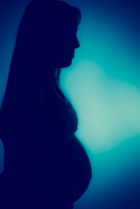 23rd – Mary (upright positions in labour)
23rd – Mary (upright positions in labour)
Travelling by donkey or walking for several days whilst heavily pregnant, and it’s thought that the journey from Nazareth to Bethlehem would have taken about four days, is probably not to be recommended. However, a Cochrane review has found that walking and upright positions during the first stage of labour shorten labour and reduce the need for an epidural or a caesarian birth, with no harmful effects on mums or babies. The evidence was of mixed quality but the findings of the higher quality trials support these results. Always great to hear about something simple that can benefit our health! You can read more about this and evidence about the advantages of midwife-led care in my blog here.
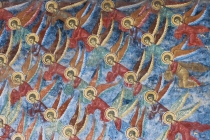 22nd – “Hear the angels sing”
22nd – “Hear the angels sing”
So Christmas is almost upon as and the words of Edmund H. Sears’ carol urge us to “hear the angels sing” but, to do that, some of us may need to unblock our ears! Problems caused by a build up of ear wax not only threaten the appreciation of angelic voices but, more critically for the NHS, are among the most common reason for people to go to their doctor with ‘ear trouble’. A Cochrane review looked at which types of ear drops work best for removing excess ear wax which is causing symptoms and found nine trials with almost 700 people, who received one of 11 different types of drops. The trials were a mixed bag in terms of quality and none of the higher quality trials showed one type to be better than another. The reviewers concluded that whilst using drops of any sort seems to be better than using none, it’s unclear if one sort is better than another. Water and saline seem to be as good as anything more fancy. Keep your ears open this Christmas; you never know what you might hear!
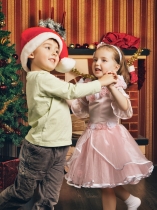 21st – Dance
21st – Dance
Many of us will testify to the feel-good effects of dance and dance/movement therapy (DMT) is used in lots of different health settings. I’ve looked at two Cochrane reviews on DMT, one for improving the mental and physical health of cancer patients and the other for people with schizophrenia. The cancer review includes two very small trials with women with breast cancer. The other has just one small trial with 45 people with schizophrenia and 40% of participants had dropped out of both the dance group and the control group by four months. In both cases, there is so little evidence from trials that the effects of DMT remain unknown. Both reviews have some useful suggestions for those undertaking future research in this area. As for you, if dancing makes you feel good then do it! I hope you get a chance to strut your stuff this Christmas.
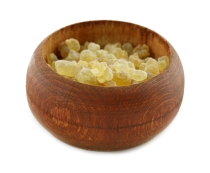 20th – Frankincense
20th – Frankincense
Frankincense is a gum resin, highly fragrant when burned, and the Bible tells us this was one of the three gifts brought to Jesus by the Magi, but could Mary have done with it (had they arrived in time!)? In a Cochrane review on aromatherapy for pain management in labour Frankincense was one of the essential oils used for this. Unfortunately, the reviewers found only two suitable trials in all and concluded that there was insufficient evidence about the effectiveness of aromatherapy to guide practice.
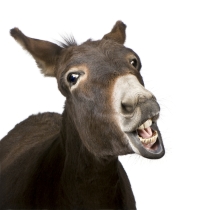 19th – the donkey (mammalian bites)
19th – the donkey (mammalian bites)
Those of us used to childbirth in hospital may shudder for all sorts of reasons at the thought of having to give birth in a stable, but one of the hazards that might not immediately spring to mind is the risk of being bitten by the ox, the ass, the visiting sheep or even the faithful donkey. Obviously Mary wouldn’t have, but it’s not unheard of for the labouring woman to bite her supporter! Prophylactic antibiotics are an option for preventing infection from bite wounds and a Cochrane review looked at whether this is an effective strategy. The evidence isn’t great and more research is needed, but there is some evidence to suggest that prophylactic antibiotics reduce infection after bites to the hand and weaker evidence that this is so for human bites. Whether they help for dog bites is unclear and there’s absolutely nothing about donkeys.
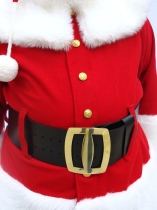 18th – Santa’s middle (weight loss or weight maintenance)
18th – Santa’s middle (weight loss or weight maintenance)
Yes I’m talking about diet again, but then advent is traditionally a time of fasting. If you’re looking to lose weight, or if you’ve succeeded in shedding some pounds and want to keep them off, can your computer help? A Cochrane review brought together moderate quality evidence from randomized trials with overweight or obese people and found that, compared to doing nothing, or minimal interventions like pamphlets, interactive computer interventions were effective. Face-to-face interventions were better still, but it’s unclear whether the amount of additional weight loss is clinically meaningful. Of course, technology changes fast and some of you will be eagerly anticipating the latest technology appearing in your stocking. That makes it hard for reviews such as this to stay current and it’s anticipated that future updates will include smartphone technology, for example. Some evaluation of costs would be useful too.
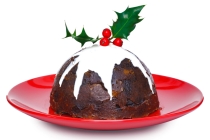
17th – Christmas pudding (dietary advice,toothbrushes and toothpaste!)
I realise that you probably won’t want to think about eating sensibly until January but, just so as you know, a Cochrane review on dietary advice for reducing cardiovascular risk (that’s things like high blood pressure, linked with heart disease) found that dietary advice seems to be effective in bringing about modest improvements in people’s diets, at least up to about a year. If you do indulge in some Christmas pudding, which we’ve been eating in some shape or form since the 15th century, better make sure you clean your teeth afterwards (though obviously that wasn’t a priority in the 1400’s, even for those who had teeth and weren’t just sucking on their meat-or-fish-with-fat-and-dried-fruit horror pudding). There’s some pretty decent new evidence this month that using a triclosan/copolymer fluoride toothpaste rather than a fluoride toothpaste without triclosan/copolymer has benefits in terms of a greater reduction in gingivitis, plaque, bleeding gums and tooth decay and no harmful effects in studies up to three years long. An earlier review found electric toothbrushes to be better than manual ones and you can check that out here. For a child-pleasing toothbrush in a stocking, though, you can’t beat the ones that flash!
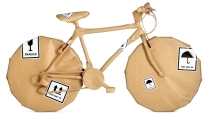 16th – new bike (injury!)
16th – new bike (injury!)
Well it’s not very festive of me to link the lovely new bike to the possibility of injury, but we health evidence folk have to face up to the worst case scenarios, and maybe we can help you avoid some of them. A Cochrane review looking at helmets for preventing head and facial injuries in bicyclists found that these injuries were significantly reduced in helmet wearers of all ages in all types of crashes, including collisions with motor vehicles. This is always a hot topic and there is much variety of opinion. The review authors’ response to comments from critics are presented in the feedback section of the review. Should you come a cropper, take note that ibuprofen and paracetamol combined provide better pain relief than the same dose of either drug alone and with a smaller chance of needing more over about eight hours, or of experiencing side effects. These are the findings of a Cochrane review on this topic, which found three randomized trials exploring these painkillers in people after they had wisdom teeth surgically removed. This is often used to investigate the effectiveness of painkillers as the results are applicable to other forms of acute pain after trauma. Stay safe this Christmas.
 15th – Stable (stable chronic obstructive pulmonary disease)
15th – Stable (stable chronic obstructive pulmonary disease)
I know, I know; it’s rather straining the festive link there, but it can’t all be stockings. Now then, a Cochrane review looked at nutritional supplementation for people with stable chronic obstructive pulmonary disease (COPD) and found moderate quality evidence that it promotes significant weight gain in these patients, especially if they are malnourished. It’s estimated that about a third of people with COPD have a degree of malnutrition, which can contribute to reduced lung function and ability to exercise and poorer quality of life, and the evidence in the review indicates that nutritional support may have benefits in these areas too. You can read more in the blog I wrote about it here, which also gives the link to the NHS Improvement COPD clinical pathway, a really nicely presented document full of useful resources.
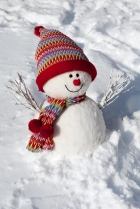 14th – snowman (local cooling for perineal trauma)
14th – snowman (local cooling for perineal trauma)
Playing in the snow is probably not something new mums rush to do, but what about cooling down their poor bashed up ladybits? Perineal trauma is common during childbirth and it goes without saying that this can be painful. Cooling the area, with ice packs, cold baths or cold gel pads, is a suggested method of reducing pain and was investigated in a Cochrane review. The quality of the evidence was generally poor. There is some, limited evidence that cooling treatments may give some pain relief in the hours or days after birth, compared with no treatment or treatments such as warm baths. With the more recent studies being better reported, it will be interesting to see if some good evidence is available when this review is updated.
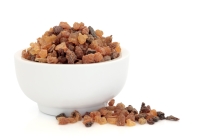 13th – Myrrh
13th – Myrrh
Many of you will be enjoying school nativity plays this week and if your small king is carrying a bottle then he’s probably the one saying “I bring myrrh”, as this gum resin could be used as an oil for anointing and embalming. In its various forms, myrrh has long been thought to have medicinal uses too and in present day Egypt a myrrh preparation, Mirazid, is marketed as a treatment for Schistosoma mansoni, a parasitic infection that is common in the tropics and sub-tropics. Chronic and advanced disease can not only cause debilitating symptoms but can lead to premature death. A Cochrane review on drugs for treating Schistosoma mansoni infection found 52 on trials various drugs treatments. Of the two randomized trials testing Mirazid, almost all failed treatment at three to six weeks and further investigation of this compound was abandoned. In terms of other drugs, it found that Praziquantel 40 mg/kg as the standard treatment for S. mansoni infection is consistent with the evidence and that Oxamniquine, a largely discarded alternative, also appears effective.
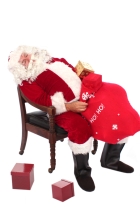 12th – Snoring Santa (obstructive sleep apnoea)
12th – Snoring Santa (obstructive sleep apnoea)
Poor Santa looks exhausted and if he’s got obstructive sleep apnoea (OSA) he probably is, all year round. Most people with this common condition snore loudly, the muscles and soft tissues of the throat block the airway and sleep is disrupted, making for some very tired people during the day. It’s also associated with a number of other health conditions. The most usual treatment is continuous positive airways pressure (CPAP), for which the person has to sleep wearing a mask, but some can’t tolerate this and its usefulness for mild OSA isn’t clear. A Cochrane review looked at drug therapy for OSA in adults. 30 trials were included and overall the quality of the evidence was low. The reviewers concluded that there’s currently insufficient evidence to recommend any drug treatment for OSA. They also say that from the data available it looks likely that drug therapy will need to be targeted according to particular features, such as OSA occurring at a particular sleep stage, which is not the case with CPAP, but larger, high quality trials are needed.
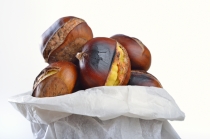 11th – Chestnuts
11th – Chestnuts
People have been eating chestnuts for thousands of years, but it doesn’t seem very clear when and where the association with roasting chestnuts at Christmas came about. All further confused in our household anyway, thanks to my husband singing “sleigh bells roasting on an open fire” which our otherwise perfectly sensible teens only recently thought to question! I digress. A Cochrane review looked at the effectiveness and safety of horse chestnut seed extract (HCSE) for chronic venous insufficiency (CVI). Compression stockings are a standard treatment for this common condition, which can cause leg pain, swelling and itching, but some people don’t like wearing them and the idea of a medicine as an alternative may be appealing. The review includes 17 randomized trials of varying quality which together suggest that HCSE is an effective and safe short-term treatment option for CVI. There appeared to be an improvement in symptoms compared with placebo and one trial comparing HSCE with stockings found them to be comparable. Side effects were infrequent and mild. But, as is so often the case, more trials are needed.
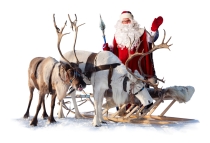 10th Flying
10th Flying
What’s the betting Santa gets terrible jet lag, what with all that whizzing across time zones in the space of one night? He might want to make a present to himself of some melatonin, as a Cochrane review has found it’s both “remarkably effective in preventing or reducing jet lag” and apparently safe, at least for short-term use. He might also want to wear stockings as well as filling them, the elastic compression sort that is. Not great for large parcels but just the job for substantially cutting your chances of symptomless deep vein thrombosis (DVT) and of swollen legs whilst flying, according to another Cochrane review. So two things that seem to work and without ill effects – glad tidings we bring, sometimes at least!
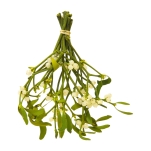 9th – Mistletoe
9th – Mistletoe
Bunches of the stuff on market stalls and in garden centres during advent suggest that our enthusiasm for the custom of hanging mistletoe in our homes is alive and well. It’s taken as an invitation to exchange a kiss, though its derivation from the Anglo Saxon words for dung (mistel) and twig (tan), and the suggestion that it was so named for bird droppings on a branch, are less than romantic! Extract of the mistletoe plant has been used by our distant ancestors for medicinal purposes and for the past century as a treatment for cancer. Its advocates say that mistletoe therapy improves both quality of life and survival and can reduce the side-effects of cancer treatments, but what evidence do we have from trials? A Cochrane review on mistletoe therapy for any type of cancer included 21 randomized controlled trials but found that the quality of the evidence was low, with flaws in the way the trials were carried out and small sample sizes. This and other problems meant that the evidence was weak and clear conclusions could not be drawn.
 8th – Ice skater (Falls!)
8th – Ice skater (Falls!)
Ditch the skates and try anti-slip shoe devices if you’re over 65 and want to reduce your risk of falling! These simple devices are among several things which have been shown to help prevent falls in a Cochrane review which brings together evidence from 159 trials with almost 80,000 people. There’s strong evidence that certain exercise programmes, including Tai Chi, can help prevent falls. Home safety interventions are particularly useful for the more frail, while switching from mutlifocal to single lens glasses was found to be helpful for those who regularly took part in outdoor activity but unhelpful for those who didn’t. When around 30% of people aged over 65 and living in the community fall each year, it’s good news is that we have evidence on what can be done to reduce their risk of falling. You can read about these and the other approaches assessed in the review in the blog I wrote for the Lifestyle Elf, here, or go straight to a Cochrane summary or the full review from the links below.
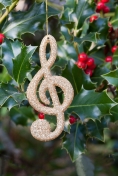 7th – Music
7th – Music
Many of us out shopping today will hear Noddy Holder screaming “It’s Chriiiiiistmaaaaas!” as the retailers attempt to get us in the mood for parting with our cash, but I suspect it’s not the best kind of music for patients in hospital. We know that the irrepressible Dr Richard Lehman of BMJ Blogs would want Bach violin sonatas, if he were to end up in ICU, as if he died and went to heaven he wouldn’t be able to tell the difference! (Click here for his journal review on this and then treat yourself to reading some more.) A Cochrane review, looking at the impact of the sensory environment on hospital patients, found that music in hospital may help improve patient-reported outcomes such as anxiety. There’s less evidence to support the use of music for physiological outcomes (such as reducing heart rate and blood pressure) and for reducing the use of medicines. Another review found that listening to music may make patients less anxious just before having surgery and could be a reasonable alternative to sedatives and anti-anxiety drugs. There’s a growing body of evidence about the health benefits of music and I’m planning a blog on this topic in the New Year. What would you choose? I’d suggest giving songs with references to body parts a miss…
 6th – Good King Wenceslas’ footprints in the snow!
6th – Good King Wenceslas’ footprints in the snow!
Bet you didn’t guess this one! In case you need a reminder of the words of the carol, you can find them here, but Wenceslas and his page did a lot of trudging in the snow in order to be charitable to the neighbouring poor. It sounds like that weary page was at risk of delayed-onset muscle soreness and instead of seeking the heat by treading in his master’s footsteps it seems he should have gone in for cold water immersion. A Cochrane review published last year found some evidence that cold water immersion reduces delayed onset muscle soreness after exercise compared with passive interventions involving rest or no intervention, though we need more and better research on this. If he wasn’t hot on evidence, Wenceslas (a 10th century Duke of Bohemia, also styled, rather fabulously, as Vaclav the Good) knew a thing or two about blessing others by his good deeds and receiving blessing himself by so doing. He would have loved this Acts of Kindness advent calendar from noomii; it’s great.
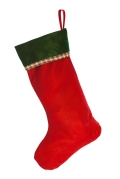 5th – Stocking
5th – Stocking
There are stockings a-plenty in The Cochrane Library and some of the evidence about them is jolly good. There’s certainly good evidence that wearing elastic compression stockings after surgery lowers the risk of deep vein thrombosis; the same review also finds that using the stockings in addition to other preventive methods (such as medicines) may be more effective than the other methods alone. Another review looked for evidence on whether knee length or thigh length stockings are best but didn’t find enough high quality evidence to answer this. If you’re planning on hanging one up rather than wearing it, go for thigh length, as there’s more room for presents! Look out for another stocking and its evidence later in advent, hiding behind a different picture.
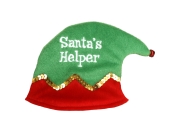 4th – Elves (and other shift workers!)
4th – Elves (and other shift workers!)
Here’s one for Santa and his little helpers (the evidence elves at the National Elf Service should prick up their ears here!). Can caffeine help reduce mistakes and injuries in workers feeling less than fully alert thanks to shift work or jet lag? A Cochrane review found no evidence to help answer this in relation to injury but some evidence that it may improve performance in shift workers. We can’t be all that confident about these results though, which mostly come from studies on young people being tested in simulated conditions, so we don’t know whether the results would be similar with older workers doing real shift work. The reviewers conclude that for those healthy people who already use caffeine (within the recommended levels) to boost their alertness, there’s no reason here to stop. Back to the subject of jet lag another day. Meanwhile, enjoy your coffee!
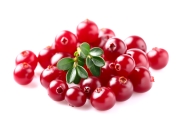 3rd – Cranberries
3rd – Cranberries
Since Delia Smith’s cranberry Christmas in 1995, we’ve gone mad for these in the UK, while our friends across The Pond eat over five million gallons of jellied cranberry sauce each holiday! But whilst cranberries are great next to your turkey, a Cochrane review has shown that they can’t be recommended to help prevent urinary tract infections. Evidence from 24 studies with almost 4,500 people suggests that cranberry products don’t offer any significant benefit in protecting us from these infections and, what’s more, we might well get fed up with them, as many people stopped taking their cranberries (especially in juice form) and dropped out of the studies. You can read more in this blog I wrote for the Lifestyle Elf last year. (Those elves had better be on the lookout for tomorrow’s evidence, which should resonate with them!)
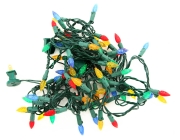
2nd – Lights
Cochrane reviewers have been untangling the knotty problem of what sort of light is best for preterm and low birth weight babies in neonatal units and two reviews, updated this year, have added some evidence on this. One review found that using cycled light may shorten the time they spend in hospital and has other benefits, though shortcomings in the evidence mean we can’t be certain. Bright light exposure was thought to put them at risk of retinopathy of prematurity, a common problem affecting the eyes of premature babies, but the updated review on this has good evidence that this isn’t so and that light reduction makes no difference.
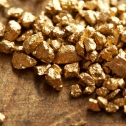 1st – Gold (a wise gift?)
1st – Gold (a wise gift?)
Gold compound has long been used for treating various conditions but how useful is injectable gold for rheumatoid arthritis? A review found four trials with 415 patients which showed that people treated with gold had 30% fewer swollen joints compared to those having placebo (dummy medicine) but almost a quarter stopped the treatment because of toxicity. Patients having placebo were much more likely to stop because it didn’t help than those having gold. You can find the review here
Links:
Continuous support in labour
Hodnett ED, Gates S, Hofmeyr GJ, Sakala C. Continuous support for women during childbirth. Cochrane Database of Systematic Reviews 2013, Issue 7. Art. No.: CD003766. DOI: 10.1002/14651858.CD003766.pub5.
Evidently Cochrane blog https://evidentlycochrane.wordpress.com/2013/07/16/where-theres-a-will-why-women-should-have-support-through-labour/
Upright positions in labour
Lawrence A, Lewis L, Hofmeyr GJ, Styles C. Maternal positions and mobility during first stage labour. Cochrane Database of Systematic Reviews 2013, Issue 10. Art. No.: CD003934. DOI: 10.1002/14651858.CD003934.pub4.
Evidently Cochrane blog: https://evidentlycochrane.wordpress.com/2013/08/22/midwives-and-movement-for-a-better-birth-experience/
Drops to remove ear wax
Burton MJ, Doree C. Ear drops for the removal of ear wax. Cochrane Database of Systematic Reviews 2009, Issue 1. Art. No.: CD004326. DOI: 10.1002/14651858.CD004326.pub2.
Dance therapy
Bradt J, Goodill SW, Dileo C. Dance/movement therapy for improving psychological and physical outcomes in cancer patients. Cochrane Database of Systematic Reviews 2011, Issue 10. Art. No.: CD007103. DOI: 10.1002/14651858.CD007103.pub2.
Frankincense (aromatherapy in for pain in labour)
Smith CA, Collins CT, Crowther CA. Aromatherapy for pain management in labour. Cochrane Database of Systematic Reviews 2011, Issue 7. Art. No.: CD009215. DOI: 10.1002/14651858.CD009215.
Cochrane summary http://summaries.cochrane.org/CD009215/aromatherapy-for-pain-management-in-labour
Mammalian bites
Medeiros IM, Saconato H. Antibiotic prophylaxis for mammalian bites. Cochrane Database of Systematic Reviews 2001, Issue 2. Art. No.: CD001738. DOI: 10.1002/14651858.CD001738.
Cochrane summary http://summaries.cochrane.org/CD001738/antibiotics-for-reducing-the-rate-of-infection-after-bites-by-mammals-such-as-humans
Santa’s middle – weight loss
Wieland LS, Falzon L, Sciamanna CN, Trudeau KJ, Brodney Folse S, Schwartz JE, Davidson KW. Interactive computer-based interventions for weight loss or weight maintenance in overweight or obese people. Cochrane Database of Systematic Reviews 2012, Issue 8. Art. No.: CD007675. DOI: 10.1002/14651858.CD007675.pub2.
Dietary advice, toothbrushes and toothpaste
Rees K, Dyakova M, Wilson N, Ward K, Thorogood M, Brunner E. Dietary advice for reducing cardiovascular risk. Cochrane Database of Systematic Reviews 2013, Issue 12. Art. No.: CD002128. DOI: 10.1002/14651858.CD002128.pub5.
Cochrane summary http://summaries.cochrane.org/CD002128/dietary-advice-for-reducing-cardiovascular-risk
Riley P, Lamont T. Triclosan/copolymer containing toothpastes for oral health. Cochrane Database of Systematic Reviews 2013, Issue 12. Art. No.: CD010514. DOI: 10.1002/14651858.CD010514.pub2.
Cochrane summary http://summaries.cochrane.org/CD010514/triclosancopolymer-containing-toothpastes-for-oral-health
Robinson P, Deacon SA, Deery C, Heanue M, Walmsley AD, Worthington HV, Glenny AM, Shaw BC. Manual versus powered toothbrushing for oral health. Cochrane Database of Systematic Reviews 2005, Issue 2. Art. No.: CD002281. DOI: 10.1002/14651858.CD002281.pub2.
Cochrane summary http://summaries.cochrane.org/CD002281/manual-versus-powered-toothbrushing-for-oral-health
Bikes (helmets, pain)
Thompson DC, Rivara F, Thompson R. Helmets for preventing head and facial injuries in bicyclists. Cochrane Database of Systematic Reviews 1999, Issue 4. Art. No.: CD001855. DOI: 10.1002/14651858.CD001855.
Derry CJ, Derry S, Moore RA. Single dose oral ibuprofen plus paracetamol (acetaminophen) for acute postoperative pain. Cochrane Database of Systematic Reviews 2013, Issue 6. Art. No.: CD010210. DOI: 10.1002/14651858.CD010210.pub2.
Cochrane summary http://summaries.cochrane.org/CD010210/single-dose-oral-ibuprofen-plus-paracetamol-acetaminophen-for-acute-postoperative-pain
Stable (stable COPD)
Ferreira IM, Brooks D, White J, Goldstein R. Nutritional supplementation for stable chronic obstructive pulmonary disease. Cochrane Database of Systematic Reviews 2012, Issue 12. Art. No.: CD000998. DOI: 10.1002/14651858.CD000998.pub3.
Cochrane summary http://summaries.cochrane.org/CD000998/nutritional-supplementation-for-stable-chronic-obstructive-pulmonary-disease
Evidently Cochrane blog https://evidentlycochrane.wordpress.com/2012/12/17/nutritional-support-may-be-useful-for-people-with-stable-chronic-obstructive-pulmonary-disease/
Snowman (perineal cooling)
East CE, Begg L, Henshall NE, Marchant PR, Wallace K. Local cooling for relieving pain from perineal trauma sustained during childbirth. Cochrane Database of Systematic Reviews 2012, Issue 5. Art. No.: CD006304. DOI: 10.1002/14651858.CD006304.pub3.
Cochrane summary http://summaries.cochrane.org/CD006304/local-cooling-for-relieving-pain-from-perineal-trauma-sustained-during-childbirth
Myrrh
Danso-Appiah A, Olliaro PL, Donegan S, Sinclair D, Utzinger J. Drugs for treating Schistosoma mansoni infection. Cochrane Database of Systematic Reviews 2013, Issue 2. Art. No.: CD000528. DOI: 10.1002/14651858.CD000528.pub2.
Cochrane summary http://summaries.cochrane.org/CD000528/drugs-for-treating-schistosoma-mansoni-infection
Obstructive sleep apnoea
Mason M, Welsh EJ, Smith I. Drug therapy for obstructive sleep apnoea in adults. Cochrane Database of Systematic Reviews 2013, Issue 5. Art. No.: CD003002. DOI: 10.1002/14651858.CD003002.pub3.
Cochrane summary http://summaries.cochrane.org/CD003002/drug-therapy-for-obstructive-sleep-apnoea-in-adults
Chestnuts
Pittler MH, Ernst E. Horse chestnut seed extract for chronic venous insufficiency. Cochrane Database of Systematic Reviews 2012, Issue 11. Art. No.: CD003230. DOI: 10.1002/14651858.CD003230.pub4.
Cochrane summary http://summaries.cochrane.org/CD003230/horse-chestnut-seed-extract-for-long-term-or-chronic-venous-insufficiency
Flying
Herxheimer A, Petrie KJ. Melatonin for the prevention and treatment of jet lag. Cochrane Database of Systematic Reviews 2002, Issue 2. Art. No.: CD001520. DOI: 10.1002/14651858.CD001520.
Cochrane summary http://summaries.cochrane.org/CD001520/melatonin-for-the-prevention-and-treatment-of-jet-lag
Clarke MJ, Hopewell S, Juszczak E, Eisinga A, Kjeldstrøm M. Compression stockings for preventing deep vein thrombosis in airline passengers. Cochrane Database of Systematic Reviews 2006, Issue 2. Art. No.: CD004002. DOI: 10.1002/14651858.CD004002.pub2.
Cochrane summary http://summaries.cochrane.org/CD004002/compression-stockings-for-preventing-deep-vein-thrombosis-dvt-in-airline-passengers
Mistletoe
Horneber M, Bueschel G, Huber R, Linde K, Rostock M. Mistletoe therapy in oncology. Cochrane Database of Systematic Reviews 2008, Issue 2. Art. No.: CD003297. DOI: 10.1002/14651858.CD003297.pub2.
Cochrane summary http://summaries.cochrane.org/CD003297/mistletoe-treatment-in-cancer-patients
Falls
Gillespie LD, Robertson MC, Gillespie WJ, Sherrington C, Gates S, Clemson LM, Lamb SE. Interventions for preventing falls in older people living in the community. Cochrane Database of Systematic Reviews 2012, Issue 9. Art. No.: CD007146. DOI: 10.1002/14651858.CD007146.pub3.
Cochrane summary http://summaries.cochrane.org/CD007146/interventions-for-preventing-falls-in-older-people-living-in-the-community
Lifestyle elf blog http://www.thelifestyleelf.net/new-cochrane-review-has-strong-evidence-that-some-interventions-can-reduce-falls-in-older-people/
Music
Drahota A, Ward D, Mackenzie H, Stores R, Higgins B, Gal D, Dean TP. Sensory environment on health-related outcomes of hospital patients. Cochrane Database of Systematic Reviews 2012, Issue 3. Art. No.: CD005315. DOI: 10.1002/14651858.CD005315.pub2.
Cochrane summary http://summaries.cochrane.org/CD005315/sensory-environment-on-health-related-outcomes-of-hospital-patients
Cold water immersion
Bleakley C, McDonough S, Gardner E, Baxter GD, Hopkins JT, Davison GW. Cold-water immersion (cryotherapy) for preventing and treating muscle soreness after exercise. Cochrane Database of Systematic Reviews 2012, Issue 2. Art. No.: CD008262. DOI: 10.1002/14651858.CD008262.pub2.
Cochrane summary and podcast http://summaries.cochrane.org/CD008262/cold-water-immersion-for-preventing-and-treating-muscle-soreness-after-exercise
Stockings
Sachdeva A, Dalton M, Amaragiri SV, Lees T. Elastic compression stockings for prevention of deep vein thrombosis. Cochrane Database of Systematic Reviews 2010, Issue 7. Art. No.: CD001484. DOI: 10.1002/14651858.CD001484.pub2.
Cochrane summary http://summaries.cochrane.org/CD001484/elastic-compression-stockings-for-prevention-of-deep-vein-thrombosis-during-a-hospital-stay
Sajid MS, Desai M, Morris RW, Hamilton G. Knee length versus thigh length graduated compression stockings for prevention of deep vein thrombosis in postoperative surgical patients. Cochrane Database of Systematic Reviews 2012, Issue 5. Art. No.: CD007162. DOI: 10.1002/14651858.CD007162.pub2.
Caffeine and shift work
Ker K, Edwards PJ, Felix LM, Blackhall K, Roberts I. Caffeine for the prevention of injuries and errors in shift workers. Cochrane Database of Systematic Reviews 2010, Issue 5. Art. No.: CD008508. DOI: 10.1002/14651858.CD008508.
Cochrane summary http://summaries.cochrane.org/CD008508/caffeine-for-preventing-injuries-and-errors-in-shift-workers
Cranberries for preventing urinary tract infection
Jepson RG, Williams G, Craig JC. Cranberries for preventing urinary tract infections. Cochrane Database of Systematic Reviews 2012, Issue 10. Art. No.: CD001321. DOI: 10.1002/14651858.CD001321.pub5.
Cochrane summary: http://summaries.cochrane.org/CD001321/cranberries-for-preventing-urinary-tract-infections
Lifestyle Elf blog. Cranberries ineffective for preventing urinary tract infections (but still nice with turkey). 17 October 2012.
Light and neonatal intensive care
Morag I, Ohlsson A. Cycled light in the intensive care unit for preterm and low birth weight infants. Cochrane Database of Systematic Reviews 2013, Issue 8. Art. No.: CD006982. DOI: 10.1002/14651858.CD006982.pub3.
Cochrane summary http://summaries.cochrane.org/CD006982/cycled-light-in-the-intensive-care-unit-for-preterm-and-low-birth-weight-infants
Jorge EC, Jorge EN, El Dib RP. Early light reduction for preventing retinopathy of prematurity in very low birth weight infants. Cochrane Database of Systematic Reviews 2013, Issue 8. Art. No.: CD000122. DOI: 10.1002/14651858.CD000122.pub2.
Cochrane summary http://summaries.cochrane.org/CD000122/early-light-reduction-for-preventing-retinopathy-of-prematurity-in-very-low-birth-weight-infants
Gold for rheumatoid arthritis
Clark P, Tugwell P, Bennett KJ, Bombardier C, Shea B, Wells GA, Suarez-Almazor ME. Injectable gold for rheumatoid arthritis. Cochrane Database of Systematic Reviews 1997, Issue 4. Art. No.: CD000520. DOI: 10.1002/14651858.CD000520.
Cochrane summary http://summaries.cochrane.org/CD000520/injectable-gold-for-treating-rheumatoid-arthritis

Pingback: A quick and easy Christmas present – Cochrane’s evidence advent calendar | Even stars explode
Reblogged this on healthcare software solutions lava kafle kathmandu nepal lava prasad kafle lava kafle on google+ <a href="https://plus.google.com/102726194262702292606" rel="publisher">Google+</a>.
Pingback: Fermetures de fin d'année » Bibliothèque interuniversitaire de Santé - ParisBibliothèque interuniversitaire de Santé – Paris